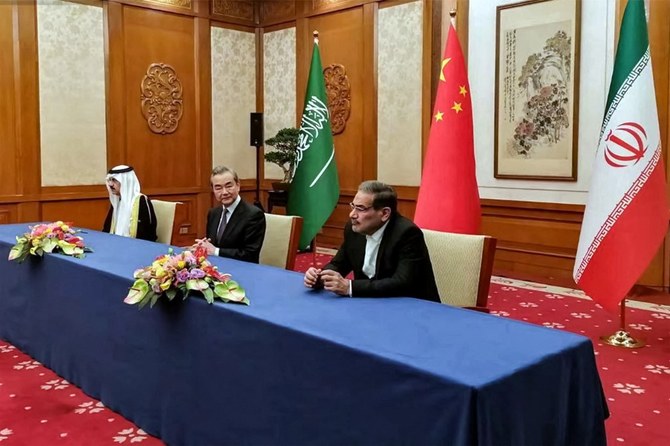
The Islamic Republic can use the Iran-Saudi pact that was announced last week as the spur to make fundamental changes to its regional policies, which would bring the Iranian nation several benefits.
First of all, when Iran builds friendly relationships with Arab states, including Saudi Arabia, Kuwait, the UAE and Bahrain, and respects their sovereignty and national interests, this will undoubtedly increase Tehran’s standing among these nations and enhance its legitimacy in the Middle East.
A lack of dialogue and diplomatic relations between countries can have unintended consequences, such as exacerbating mistrust and causing misunderstandings, tensions, conflict or even wars. According to FutureLearn, the main role of diplomacy is to “ensure peaceful relations between countries. This might include negotiating trade deals, discussing mutual problems, implementing new policies, and tackling disputes. The consequences that can arise if diplomatic relations are not had can be very serious — conflict, violence, and even war.”
The economic benefits of having good relationships and diplomatic ties with other countries, particularly neighbors, are countless. For example, when it comes to the tourism industry, the Islamic Republic could attract more visitors, which would significantly contribute to its economic development and provide revenue for ordinary people in Iran, along with small businesses.
Iran is home to 21 UNESCO World Heritage sites, the ninth most of any country worldwide. A 2019 report by the ILIA Corporation stated: “Iran, the land of four seasons, history and culture, souvenir and authenticity with mountains and deserts, forest, plains and seas, cultures and traditions has an immense potential for attracting international tourists. Travel and tourism is an important economic activity in most countries. As well as its direct economic impact, the industry has significant indirect and induced impacts … Iran has been recognized as the most cost-competitive travel destination by the World Economic Forum due to low fuel prices, cheap hotel rooms as the most common reasons.”
If Iran had friendly ties with other nations in the region, the US might think it appropriate to lift sanctions against Tehran
Dr. Majid Rafizadeh
If Iran had friendly ties with other nations in the region — and if it was no longer seen as a threat but, rather, a constructive player — the US might think it appropriate to lift sanctions against Tehran. US sanctions on dozens of industries besides oil and gas, such as metal and gold, could also be lifted.
Iran possesses the world’s largest untapped emerging market in the world, worth more than $1 trillion. Opportunities exist in almost every sector and the economy desperately needs new capital. With the easing of sanctions, the country’s global legitimacy would increase and foreign businesses would be permitted to operate there. Iran would reenter the international community, the international banking and financial systems, and the open market for oil. This would help the country realize its economic potential as the second-most-populous nation in the Middle East. It has a sizable, educated and savvy middle class, as well as the world’s second and fourth-largest gas and oil reserves, respectively.
The Western world has already welcomed the agreement between Saudi Arabia and Iran. Peter Stano, EU external affairs lead spokesperson, said: “The European Union welcomes the announced agreement on resumption of diplomatic relations between the Kingdom of Saudi Arabia and the Islamic Republic of Iran, and looks forward to its implementation … (the EU) remains ready to engage with all actors in the region in a gradual and inclusive approach, and in full transparency.”
In addition, when the Iranian government builds trust and genuine diplomatic ties with its Arab neighbors, it would see no reason to support its proxies any longer. Imagine the amount of money the Islamic Republic would save if it stopped supporting its proxies in the Middle East. In addition, if these nonstate actors and groups failed to receive financial and weapons support, their power to create unrest and conflict in the region would greatly diminish. This would enhance Middle Eastern stability and security and make the region safer and more prosperous for all nations.
Iran would also be able to redirect the billions of dollars that it is currently hemorrhaging on its proxies toward creating jobs at home, increasing wages and upgrading its infrastructure. This would reduce the economic frustration felt by many Iranians. One of the underlying reasons for Iran’s recurring protests is the economy, particularly rampant inflation, high unemployment and low wages.
Furthermore, Iran would be able to attract foreign investment and countries in the region would increase their trade with Iran, helping Tehran fulfill its economic potential. It is worth noting that Saudi Arabia has the largest economy in the Arab world and is the largest free economic market in the Middle East and North Africa.
Finally, the Iranian government can learn a critical lesson from world history. Europe was affected by conflict — two world wars that devastated its populations and economies — but, in the late 1940s, several nations charted a path toward improving their diplomatic ties, economies and living standards. They subsequently became prosperous by concentrating on domestic issues and improved relationships with their neighbors.
In a nutshell, the ball is in Iran’s court. The Islamic Republic can use the momentum generated by its agreement with Saudi Arabia to change its regional policies, improve its ties with all Arab nations and subsequently enhance its economy and legitimacy in the Middle East.
Dr. Majid Rafizadeh is a Harvard-educated Iranian-American political scientist. Twitter: @Dr_Rafizadeh











